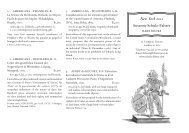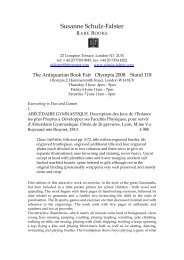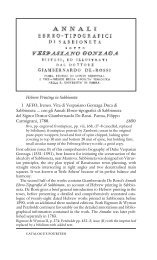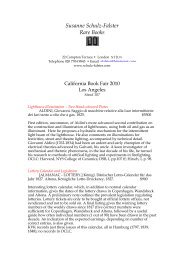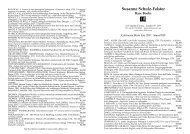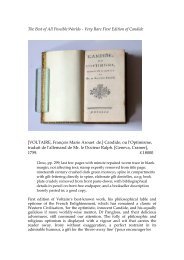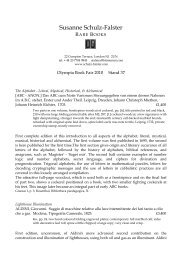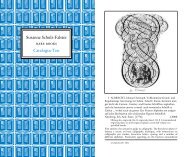Susanne Schulz-Falster Catalogue Ten
Susanne Schulz-Falster Catalogue Ten
Susanne Schulz-Falster Catalogue Ten
You also want an ePaper? Increase the reach of your titles
YUMPU automatically turns print PDFs into web optimized ePapers that Google loves.
incompatible with the concept of balanced trade and naval commerce, as<br />
the interests of diVerent nations will always be mutually exclusive. In extremis<br />
the diVerences will lead to war, which by deWnition damages the<br />
trade balance of all combatants. Justi gives a detailed introduction to the<br />
principles that characterise international trade, i.e. the proper balance between<br />
free enterprise and state intervention. He concludes with an interesting<br />
chapter on the trade of neutral powers in time of war, one of the basic<br />
principles of international law.<br />
Goldsmiths’–Kress 9482.4; Humpert 10090; OCLC records copies at Harvard,<br />
the University of Wisconsin and Keio University.<br />
Balance between State Intervention and Free Enterprise<br />
160 JUSTI, Johann Heinrich Gottlob von. Die Grundfeste zu<br />
der Macht und Glückseeligkeit der Staaten; oder ausführliche Vorstellung<br />
der gesamten Policey-Wissenschaft. Königsberg und<br />
Leipzig, Joh. H. Hartung, 1760, 1761. £3200<br />
Two volumes, 4to, pp. [xxiv], 782, with Wve folding plates; [xvi], 651;<br />
woodcut head and tail-pieces and initials; some light browning, due to<br />
paper quality; entirely uncut in contemporary pale blue beech boards,<br />
gilt-lettered spine label to spines, gilt supralibros to upper boards; a<br />
little chipped, and corners bent; from a Swedish noble library.<br />
First edition, uncommon, of Justi’s important comprehensive handbook of<br />
cameralistic science, in particular public policy – his blueprint for the welfare<br />
state. In it Justi presented a strikingly modern view of the proper balance<br />
between free enterprise and state intervention. While he championed<br />
the welfare state, and accepts the state’s responsibility for the moral and<br />
economic conditions of life, in particular for everyone’s employment and<br />
livelihood, he stopped short of advocating excessive state intervention. He<br />
was aware of the inherent logic of economic phenomena, and attempted to<br />
limit government interference in price and interest rate Wxing. Justi ‘saw the<br />
practical argument for laissez-faire not less clearly than did A. Smith, and his<br />
bureaucracy, while guiding and helping where necessary, was always ready<br />
to eVace itself when no guidance or help seemed needed. Only he saw much<br />
more clearly than did the latter all the obstacles that stood in the way of its<br />
working according to design... (Schumpeter, p. 172). In his Grundfeste he<br />
devotes much attention to government statistics, population and subsistence,<br />
manufacturing industry and commerce, with the second volume concentrating<br />
more on public and civic administration, including insurance,<br />
Wre services, poor law etc.<br />
Einaudi 3103; Goldsmiths’–Kress 9637.4; Humpert 8496; Menger c 50; RLIN<br />
lists copies at Michigan, Princeton, and New York Public Library.<br />
susanne schulz-falster rare books catalogue ten<br />
161 JUSTI, Johann Heinrich Gottlob von. Die Natur und das<br />
Wesen der Staaten, als die Grundwissenschaft der Staatskunst, der<br />
Policey und aller Regierungswissenschaften, desgleichen als die<br />
Quelle aller Gesetze. Berlin, Stettin und Leipzig, Joh. H. Rüdigers,<br />
1760. £3000<br />
8vo, pp. xiv, 488, [32] index; woodcut head and tail-pieces and initials;<br />
contemporary full sheep, spine in compartments, gilt-lettered spine<br />
label; head of spine repaired; a very clean and crisp copy from the<br />
Donaueschingen Library.<br />
First edition of Justi’s most explicit treatise on political philosophy. ‘An advocate<br />
of enlightened despotism... he uses the postulate of the general happiness<br />
to provide an ethical foundation for the welfare state and explains the<br />
formation of the state by the social contract, entered into when the instinct<br />
for self-preservation impelled men to renounce their freedom.’ In his work<br />
he combines the tendencies of the mechanistic and rationalistic school represented<br />
by WolV and Pufendorf with the more organic ideas of<br />
Montesquieu. In his treatise he also intended to show that ‘all the sciences<br />
embraced in the general sense of the term ‘cameralism’ are deductions from<br />
a fundamental political philosophy (Small, p. 400).<br />
Higgs 2415; Masui p. 916; Menger, c. 51; uncommon NUC, RLIN and OCLC<br />
list copies at Harvard, Chicago, and Columbia.





